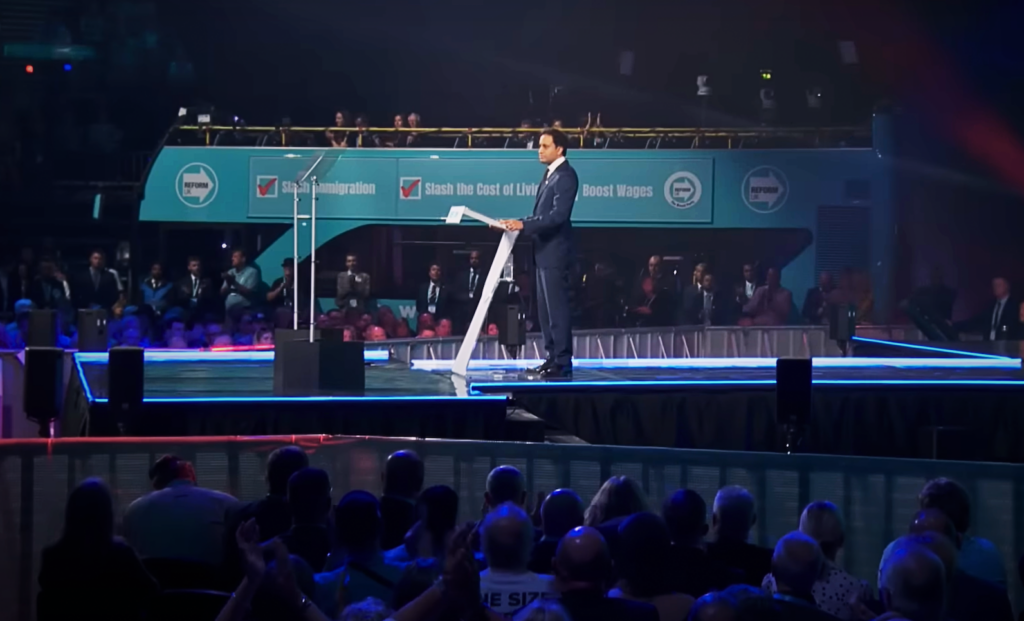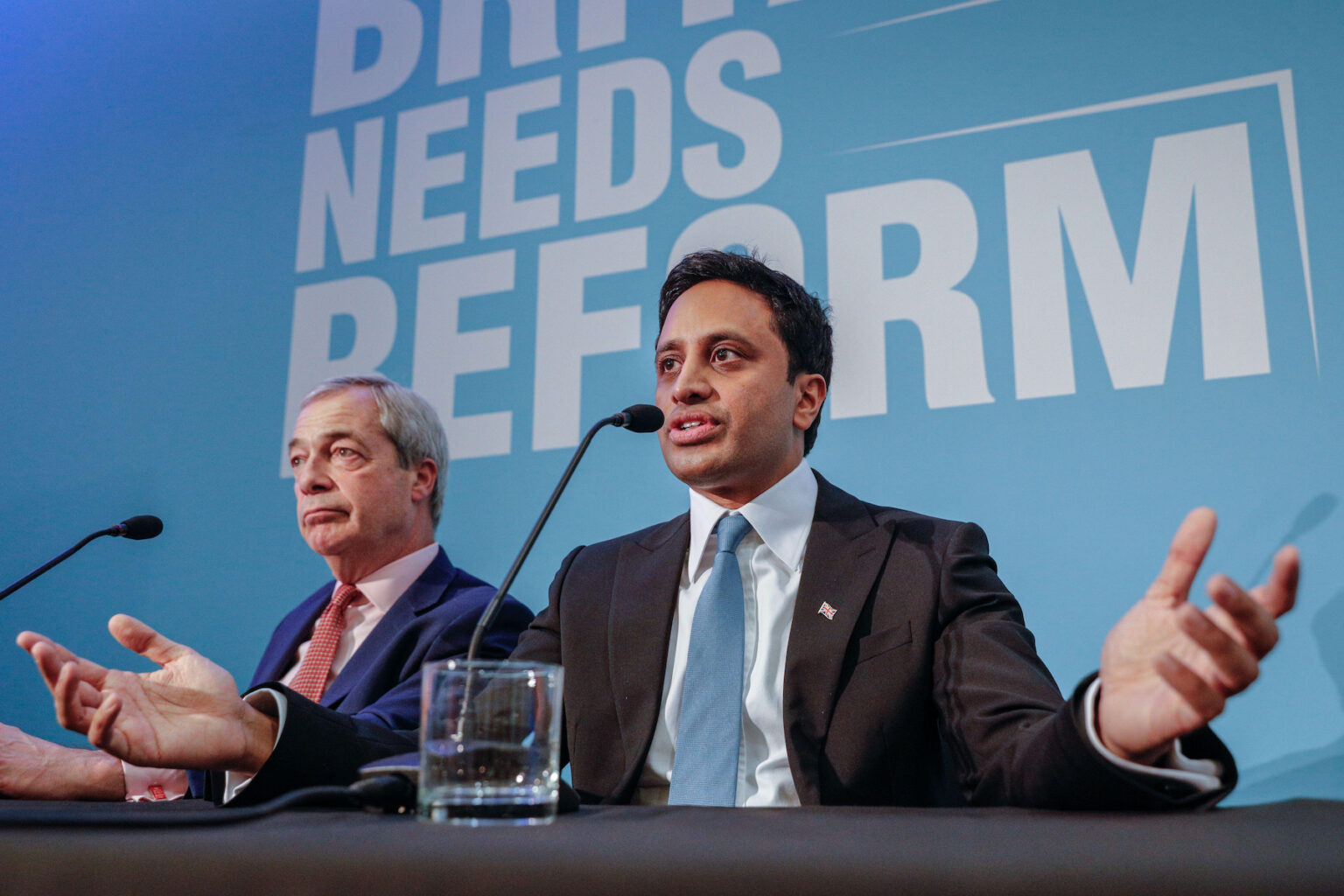Reform UK’s new constitution grants “extraordinary” levels of power to its chair Zia Yusuf, DeSmog can reveal.
The party rulebook grants the multi-millionaire tech entrepreneur extensive, largely unchecked authority to revoke memberships, set the party’s agenda, take emergency disciplinary measures, and suspend potential candidates – without any formal way to sack him.
DeSmog asked academics and expert campaigners to review Reform’s 17-page constitution, adopted in September. While the new rules have been portrayed in sections of the media as “democratising” the party, the opposite appears to be true.
“Officially it would be quite difficult to engineer Yusuf’s dismissal,” said Dr Tim Bale, an expert on contemporary British politics and a professor of politics at Queen Mary, University of London.
Subscribe to our newsletter
Stay up to date with DeSmog news and alerts
Yusuf, who has been called the “gatekeeper” and “right hand” of party leader Nigel Farage, was appointed as Reform’s chair in July 2024 after donating £200,000 to the party. Reform achieved a major breakthrough in last week’s local elections in England, winning 677 council seats, two new regional mayorships, and one new member of Parliament.
Yusuf has featured prominently in the media following these results, credited with the apparent “professionalisation” of the party in the run up to the vote. Reform’s chair, who is an admirer of far-right tech entrepreneur and Trump official Elon Musk, told The Times in the wake of Reform’s sweeping victories that the party is “just getting started” on its journey to becoming “a really formidable election-winning machine”.
Yusuf’s influence looks set to grow over the coming years, formalised under the party’s constitution, which allows him to serve in the role without a term limit, and without a process for his removal – not even by Farage.
“The chairman of Reform is in a much more powerful position than his equivalent [in Labour or the Conservatives]. To actually devolve that power to one person is quite unusual,” Bale told DeSmog.
Yusuf is a vocal opponent of climate action – mirroring the policies of his party, which campaigns to scrap clean energy targets and ramp up fossil fuel production. He has called oil and gas reserves in the North Sea a “gift from god”, argued that not drilling those reserves is a “catastrophic act of self-harm” for Britain, and said the UK’s efforts to achieve net zero emissions by 2050 are “religious madness”.
“Like a lot of Reform’s pledges, Zia Yusuf’s claims that he has democratised his party are completely hollow and misleading,” said Agustina Oliveri, head of campaigns and communications at the Good Law Project.
“Reform’s constitution is nothing other than a power grab for Yusuf and Farage, which grants them an extraordinary amount of power within the party.”
Reform has been approached for comment.
The Constitution
The Reform constitution, which Yusuf reportedly drew up himself, details a long list of his exclusive powers.
As chairman, he can refuse or decline to renew any Reform membership “without reservation or qualification” and revoke memberships at his “discretion”. He can suspend any candidate he deems “may damage the reputation or interests of the party”, set the “motions for debate” at party conferences, and declare “emergency powers” to discipline a party member.
Yusuf presided over the adoption of the constitution on 21 September, when it passed by show of hands at Reform’s annual conference in Birmingham. The document has since been submitted to the Electoral Commission.
Before the conference, Yusuf told GB News that the purpose of drafting a new document was to democratise the party.
“Members need to be given a democratic set of rights in our constitution,” he said. “That document must be fit for purpose today, for the next year, and also for when we’re in government.”
These claims do not appear to be matched by reality.
“The constitution at Reform is very much a hierarchy rather than a democracy,” Bale told DeSmog.
Some of Reform’s previous allies have also been unhappy with the constitution. The party’s former deputy leader Ben Habib told The Guardian in February: “The constitution does not in my view give the ability for members to remove the leadership… the constitution is still suboptimal – to put it mildly.”
Now that the constitution has been approved, changing it would be difficult. Amendments require a two-thirds vote from all party members, currently requiring at least 151,000 votes.
Farage and Yusuf, who have known each other for nearly a decade, have a close relationship. They met at a cocktail party hosted by Stuart Wheeler, the former treasurer of UKIP, the party led by Farage from 2006 to 2016. At the event, Yusuf discovered that their “views of the world [and] philosophies aligned very, very well.”

Since his appointment, Farage has tasked Yusuf with making the party more professional. The process has not been smooth. Reform has suffered from infighting – the party is now in a legal battle with its former MP Rupert Lowe – while several of its 2025 candidates were exposed (as in previous elections) for posting far-right views online.
However, Yusuf has overseen the expansion of the party to over 200,000 members, and has grand ambitions for its future – claiming it’s on “a journey to winning a majority in the House of Commons with Nigel as our prime minister”.
Yusuf and Farage are the two directors of Reform 2025 Ltd, the not-for-profit company incorporated in February to represent the party’s political activities. The party had previously received criticism for operating under a limited company owned by Farage.
And, while there is currently harmony between Farage and Yusuf, their overlapping powers potentially set the stage for a future tug-of-war for supremacy within the party.
“You could get into a situation where there was a battle for control of the party between the chairman and the leader. It could get very messy indeed,” Bale said.
Cheques and Balances
A three-page handout seemingly circulated during the party’s annual conference contained “Key summary points from the proposed constitution”. In the document, the chairman’s role is simply listed as: “oversee[ing] meetings, conferences, and organisational matters”.
However, the full constitution details significantly more responsibility than the summary.
Additional powers given to the party chairman, beyond those already listed, include that any prospective Reform candidate must provide “full disclosure of any material fact, political or personal” that may affect their candidacy to Yusuf in writing. He is also tasked with “safeguarding” the party membership databases.
The document does contain a few checks to the chairman’s powers. Decisions to refuse, revoke, or decline to renew membership can be appealed, but only require review by the party secretary and either two board members or “two persons independent of the party”. In theory, those two people could be anyone outside Reform, and the document does not say how they would be selected.
If Yusuf suspends a candidate, the board must “proceed to determine” the final outcome, but the nature of that review is unclear from the constitution. Board members can be appointed by the party leader as well as elected by a party-wide ballot.
And, since Reform has not yet publicly announced a party secretary, Yusuf’s power as chairman may not even have these constitutional checks. Reform did not respond to a DeSmog request for comment on the identity of its party secretary.
Therefore, perhaps unsurprisingly, Yusuf’s constitutional powers are already causing ripples in the party. Reports suggest that Yusuf’s team has investigated, and expelled, members over their social media posts.
Howard Cox, a former Reform candidate who has since left the party, told the BBC in March that “over a dozen Reform branches have contacted me, stating that they have been replaced, overridden, and disrespected by Zia Yusuf’s headquarters team”.
“Reform UK’s vetting system is meaningfully more rigorous than anything that the other parties do,” Yusuf stated at the time.
In a statement to DeSmog, the party said: “The full constitution was shared with all members several days before the vote and full copies were made available ahead of the vote at the conference. Reform voters knew exactly what they were voting for and backed it with an overwhelming majority.”
The UK’s Elon Musk?
Aside from attempting to win a general election, how does Yusuf intend to apply his newfound power?
The party chair has not been shy about his long-standing admiration for Elon Musk – who he has praised as the “ideal person” to oversee Donald Trump’s Department of Government Efficiency (DOGE), which aims to radically reduce the size of the federal government.
Yusuf, who traveled to Washington D.C. in January for Trump’s inauguration, has regularly praised Musk’s entrepreneurship and leadership of DOGE, telling the BBC’s Nick Robinson that he’s “tried to learn as much as I can about him”.
DOGE has made sweeping cuts to public services – including to climate agencies – sacked government staff en masse, and closed whole departments with no oversight or transparency.
“President Trump’s victory represents the rejection of open borders, socialist economics, woke ideology, net zero fanaticism and [diversity, equity, and inclusion] by right thinking people in America,” Yusuf said in November. “The UK is next”.
Reflecting Musk’s agenda at DOGE, Yusuf has said he wants Reform to “identify, immobilise and remove all elements of the Blob [British civil service] hostile to the interests of the British people”.
This includes obstructing climate action. Ahead of the local elections, Farage claimed councils were wasting money on climate policies, and called for “a British DOGE” to be established in “every county and every local authority in this country”. These efforts would seemingly be directed by Yusuf.
“We can hope that Reform’s members will finally wake up and realise that their leaders are snake oil salesmen,” said Oliveri Agustina of the Good Law Project. “But when that day comes, they will find that their voices don’t matter”.
UPDATE – 09:00 BST – 8 MAY
A comment from Reform UK was added on the constitution being provided in full to members prior to the 2024 party conference vote

The sole responsibility for any content supported by the European Media and Information Fund lies with the author(s) and it may not necessarily reflect the positions of the EMIF and the Fund Partners, the Calouste Gulbenkian Foundation and the European University Institute.
Subscribe to our newsletter
Stay up to date with DeSmog news and alerts






